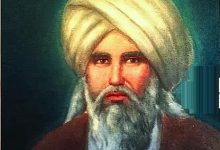Biography of Abdul Qadir Gilani, poet and mystic of the 6th century

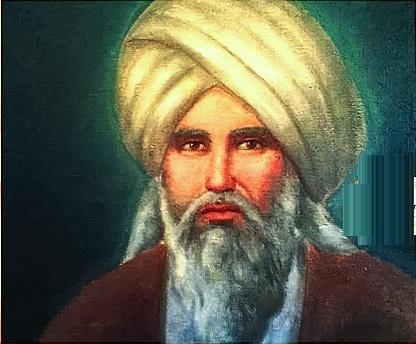 Abdul Qadir Gilani
Abdul Qadir GilaniBiography summary of Abdul Qadir Gilani
Full name: Abdul Qadir bin Abi Saleh
Date of birth: 1 Ramadan 471 AH
Place of birth: Sera Monastery, Gilan
Place of residence: Gilan, Baghdad
Profession: Mystic, Sufi, Muhaddith, and poet
Died: 8 Rabi Al-Awwal 561 AH
Burial place: Bab al-Sheikh neighborhood of Baghdad
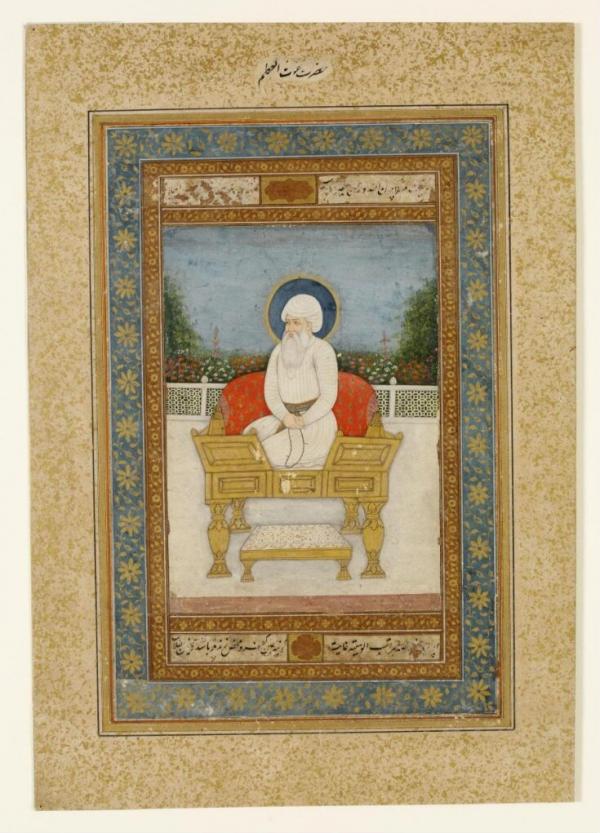 Biography of Abdul Qadir Gilani
Biography of Abdul Qadir GilaniBiography of Abdul Qadir Gilani
Abdul Qadir bin Abi Saleh was born on the 1st of Ramadan 471 AH in the village of “Pashtir Soumesara” in the districts of Gilan. Of course, there is a difference regarding the year of his birth and some have named it as 470, 490 or 491. Behind the monastery is the tomb of the mother of this great mystic.
Abdul Qadir Gilani was born during the rule of Malik Shah Seljuq, for this reason he had the support of this ruler and his minister Khwaja Nizam al Mulk. Because of the friendship between these two people, their reign is known as the period of science, of course, it should be noted that the conflict between the heirs of the kingdom after the murder of Malik Shah, as well as the emergence of the Nazarite sect from Ismailia under the leadership of Hassan Sabah and the Crusades and the conquest of Jerusalem by Christians. removed peace and stability from people's lives.
Seyyed Musi Jangidoost was the son of Seyyed Abi Abdullah Gilani, the father of Abdul Qadir Gilani, who was considered to be the son of the elders of Gilan, and he married Umm al-Khairama Al Jabar Fatima. He had about 49 children, 27 of them were boys and the rest were girls. His survivors were expelled from Mesopotamia by Shah Ismail I due to the events of the conquest of Baghdad.
Education of Abdul Qadir Gilani
Abd al-Qadir Gilani learned literary sciences from Abu Zakaria Tabrizi in Baghdad, and then he started learning the science of hadith from Abu Bakr bin Ahmad, Abul Qasim Ali bin Ahmad bin Bayan, and Abu Talib bin Yusuf. He also learned jurisprudence from Ali bin Abi Saeed Mokhrami and learned the techniques of tariqat from Sheikh Ahmad (or Hammad) Dabas.
Abdul Qadir Gilani started taking notes of scientific materials and made many efforts in this field, so that he became associated with travel, austerity, contemplation and solitude. Some of these materials are recitations of his sermons, such as “Fath al-Ghaib”, which consists of 78 of his sermons, which were written by his son after his death.
Abdul Qadir Gilani started his preaching meetings in the school built by Abu Saad Mokhrami in Bab al-Azaj area of Baghdad, and the people also welcomed it so that many of them came to Gilani to repent. Since the school was filled with people and could not accommodate more people, they expanded the school. Sheikh Abdul Qadir taught in this school and preached to the people until the end of his life.
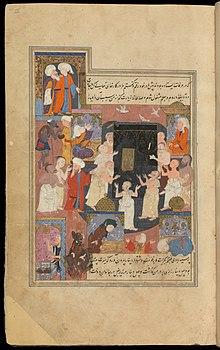 Historical photos by Abdul Qadir Gilani
Historical photos by Abdul Qadir GilaniServices and activities of Abdul Qadir Gilani
In the fifth century, when Sufism and Tariqat were separated from Sharia, Abdul Qadir Gilani, as one of the most stubborn opponents of this issue, made many efforts to harmonize Tariqat with Sharia, as well as obeying and following the Qur'an, the Sunnah, and giving them sovereignty in All things of life were considered the basis of affairs.
Abdul Qadir Gilani's many efforts to reform Sufism can be classified in the following dimensions:
Reforming Sufism with what was mixed and returning it to its original mission, turning Sufism into an educational school whose main goal is to cultivate the meanings of celibacy and pure heartlessness from the world and true asceticism.
Dealing with people who deviated from Sufism and considered this issue as a means of showing off, also caused a change in Sufism. Abd al-Qadir Gilani, without taking a name from the Sufi family, classified them in order to clarify the characteristics that make Sufism adhere to the book and tradition. On the other hand, he could not arouse the enmity or discomfort of the deviants by doing this. Sects with the titles of Abahiya, Matkamalah, Mushregheh and…
Another action of Abd al-Qadir Gilani was to regulate the Sufi sects and create unity among the sheikhs. In order to realize this issue, he made invitations for the gathering of Sufi Sheikhs, and their first gathering took place in Rabat (Kain) located in the Aleppo region of Baghdad. 50 Sheikhs from Iraq and other countries were present in this gathering. The next step for this issue was to establish communication between the sheikhs of Tariq outside Iraq, for this purpose also the gathering of Sheikh Abdul Qadir during Hajj, with the presence of Sheikh Uthman Ibn Mansour Qurashi, who organized the training of disciples in Egypt. One of the most important results of this gathering was the unity between the Sufi sects led by one.
Among the works of this gathering in the revival of religion, they have listed the following:
The unity of action in the movement of Sophia
different methods; He used to send high-level students and disciples who had the ability to become sheikhs to the Qadiriya school. For example, Abu Madin al-Maghribi, who sent his disciple “Saleh Ibn Virjan Zarkani” to Abdul Qadir, or Sheikh Arsalan of Damascus, who told his disciples, “Our Sheikh and yours is Abdul Qadir.”
The relationship between jurisprudence and Sufism went closer and closer until the one who was called a jurist; He had Fiqh and Sufism side by side and was called to perfect Sharia and Tariqat.
The emergence of Sufism from seclusion and seclusion and its confrontation with the threats that threatened the Islamic world. Based on the reports left behind; Qadiriya School played an important role in equipping and preparing the troops to face the danger of the Crusaders in Syria. This school prepared young people who were forced to flee after the arrival of the Crusaders to go to the battlefield with trained commanders.
Abdul Qadir Gilani constantly criticized the autocratic rulers, of course, considering the popularity of this person among the people, the rulers could not confront him. Regarding this issue, Ibn Kathir Damaschi says: “Imam Abd al-Qadir never neglected the wise advice and zealous criticism of the rulers and judges, and he harshly condemned the behavior of the sultans' henchmen; And he calls them to the straight path of God's religion.”
In his time, Abdul Qadir Gilani created a tremendous transformation among Muslims and he distanced people from resorting to the Abbasid rulers, and also called them to reconsider their behavior and pay attention to God. It is stated in the book of Fatah al-Rabani that Gilani said in one of his sermons:
“You who have trusted in yourself, in people, in money and capital, in dealings, in the sultan and ruler, and in other things, know that all of them have truly become your gods!… O servants of the ring, listen to the idol of wealth and the idol of government! Know that they have created a solid wall between you and the One God. Whoever imagines that his benefit and loss are in the hands of someone other than God, he is truly not a servant of God, but a slave is the one who demands his benefit and loss from him.
It is also mentioned in the book “Qalaed Al Jawahar”:
When Al-Maqtazi Lamar Allah Caliph Abbasi left the position of judge in Baghdad to an unworthy person like Abulofa Yahya bin Saeed, Abdul Qadir Gilani said to him in the Friday prayer in which the Caliph himself was present: Caliph, you have appointed an unworthy person to the position of judge. What answer will you have for this issue on the day of judgment and when you will be in the presence of Hazrat Haqq, when the case of your deeds is examined? The caliph was indifferent to Imam Abd al-Qadir's sincere and benevolent words and at the same time zealous, and the next day he ordered the dismissal of the judge.
Abd al-Qader Gilani's preaching meetings in the Qadiriya school became very prosperous, sometimes the crowd was so large that they had to set up related meetings in empty places outside Baghdad. People used to come to Abd al-Qadir Gilani with horses and mules and stand on the edge of the parliament or next to the wall. Some historians say that about seventy thousand people used to attend this sage's assembly and listen to his words.
Abdul Qadir Gilani had heard his hadiths from people like Abu Ghalib Baqlani, Ahmad bin Muzaffar bin Sosan Tamar, Abu al-Qasim bin Bayan, Jafar bin Ahmad Siraj, Abu Saad bin Khashish, Abu Talib Yousefi and others, and people like Abu Saad Samaani, Omar bin Ali Qurashi and Hafez. Abdul Ghani, Shaykh Moafaquddin Ibn Qudama, Shaykh Ali Bin Idris, Ahmad Bin Mati Bajsarai, Muhammad Bin Laith Wastani, Akmal Bin Masoud Hashemi and others had also heard hadith from him.
In the principles and branches of jurisprudence and Sufism, many works are attributed to him. The poetic divan of this mystic is known as the Diwan of Ghouth Azam. In a poem, he is called “Mohiy”.
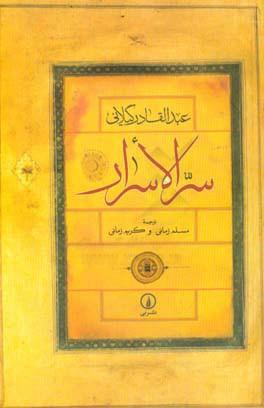 The works of Abdul Qadir Gilani
The works of Abdul Qadir GilaniAbdul Qadir Gilani passed away
Abdul Qadir Gilani died in 561 AH and was buried in the school where he taught people for a lifetime.
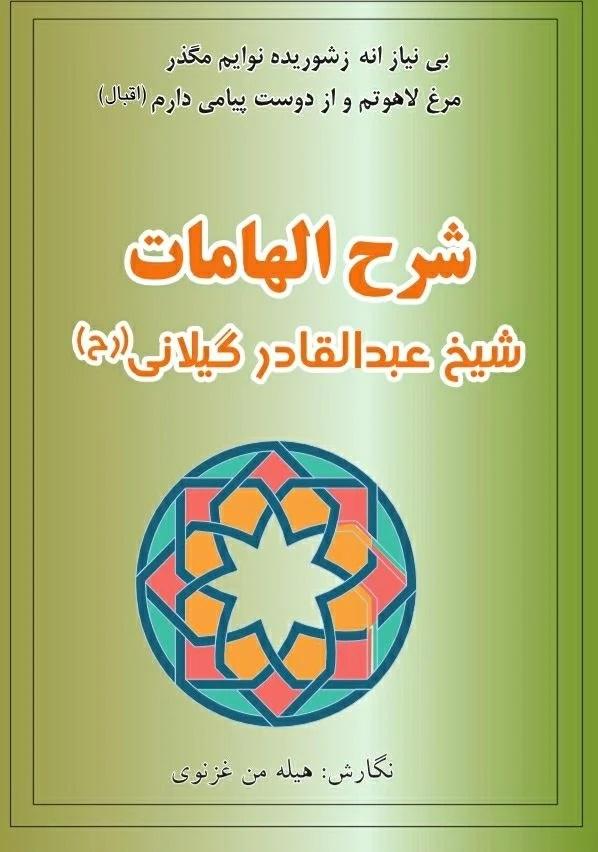 Abdul Qadir Gilani's books
Abdul Qadir Gilani's booksThe works of Abdul Qadir Gilani
Abdul Qadir Gilani left behind many works in the field of conduct, these canabs were written in the form of prayers and remembrances, sermons and poems. Among them, the following can be mentioned:
– Etiquette and reaching the houses of the royals.
– The gift of the pious and the mustache of the wise.
– Jala al-Khater in al-Batin and al-Zahir.
– The Raja and End party.
– Yuaqit al-Hakm.
– Meraj Latif al-Ma'ani.
– Al-Fath al-Rabani and Al-Faiz al-Rahmani.
– Abd al-Qadir al-Jilani Court.
– Al-Ghaniyyah Latalibi Tariq al-Haq.
– Fatuh al-Ghaib.
– Message of al-Ghouthieh.
– Al-Fiyuzat al-Rabani in Al-Awarad al-Qadiriyyah.
Al-Kubrit al-Ahmar.
– Degrees of Existence.
compilation: Cover biographical section
